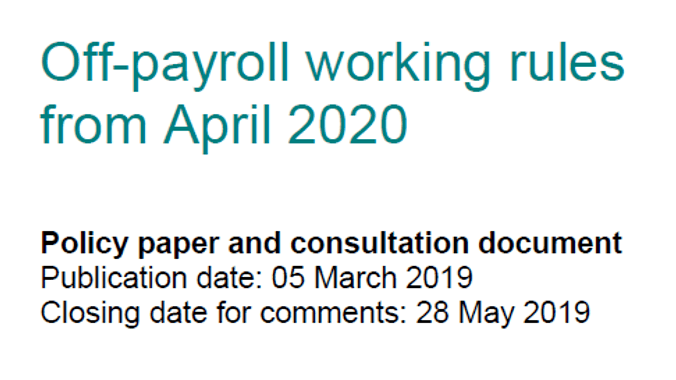HMRC has today launched its latest consultation for the proposals to introduce the draconian Off-Payroll working rules to the private sector. With Government having already announced via the 2018 Budget its intention to enact the plans in April 2020, the latest consultation seeks to ensure the proposals are suitable for the private sector.
The consultation reads: ‘This consultation is intended to provide organisations and off-payroll workers with greater certainty around how the off-payroll working rules will operate from 6 April 2020 and the obligations and responsibilities of the various parties involved in the labour supply chain.’
It adds: ‘The government understands that many organisations will be keen to begin preparations and has therefore included in the education and support section of this document actions that affected organisations can take now to prepare for the reform.’
Respondents have until 28 May 2019 to provide feedback.
Will Government act on stakeholder Off-Payroll feedback?
“This consultation reads like a plan to simply copy and paste the existing public sector rules into the private sector,” warns ContractorCalculator CEO Dave Chaplin.
The consultation comes less than ten months after the launch of a previous consultation seeking feedback on three proposals for the reformation of IR35 in the private sector. One of these was an extension of the public sector rules.
Stakeholders viewed the consultation as a formality, suspicions that were proved true when HMRC’s summary of responses concluded that extending the Off-Payroll rules was the most suitable option.
Though Government has announced intentions to make certain concessions in response to feedback, including an exemption for small businesses, many serious concerns were dismissed or ignored.
“The big question over this consultation is whether Government is actually going to listen to the feedback provided, or whether it is simply treating this as another box to tick ahead of April 2020,” continues Chaplin.
“As was the case with the previous consultation, there will be many issues and points of contention raised in response to the latest publication. If Government is insistent on forcing these draconian rules upon to private sector, surely the very least we can expect is to have our feedback taken on board.”
Anti-business proposals are a disaster for UK Plc
One of the most common criticisms levelled against the proposals concerns HMRC’s assumption that the perceived success of the rules in the public sector will automatically translate into the, entirely different, private sector.
“There is a fundamental difference in the private sector, where companies are trying to grow, have value and are listed on stock exchanges. Central to this growth is the use of contingent workers,” notes Chaplin.
“The structure of the new rules will result in a rapid build-up of uncertain tax risk on a company’s balance sheet, equivalent to 50% of their annual cost of hiring contingent workers. This reduces a company’s value, and any subsequent HMRC investigation could quickly force it into bankruptcy. The legislation, therefore, effectively raises a sign to entrepreneurs that says, ‘do not start a company here’.”
Chaplin concludes: “In any case, regardless of sector, inserting a complex and highly subjective status test to the heart of the entrepreneurial economy will significantly damage UK Plc.”

